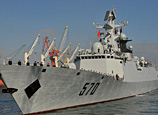
BEIHAI, April 12 (Xinhua) -- China's coastal areas are suffering from maritime pollution as scenic spots and local environments become increasingly threatened.
Two days of gales last week resulted in almost sixty tonnes of garbage ending up onshore at Silver Beach, dubbed China's No.1 beach, in the southern coastal city of Beihai in Guangxi Zhuang Autonomous Region.
Alongside natural waste such as seashells, seaweed and dead crabs, rubbish dotted the site, turning Silver Beach into a land of garbage.
Plastic bags, beer bottles, shattered glass and bamboo sticks used for barbecues were seen piled up in the middle and eastern areas of the beach, thanks to southwestern monsoons.
But the 60 tonnes of rubbish is just part of a broader picture.
Last year alone, an estimated 1,800 tonnes of garbage was found on the beach, according to Yin Fengzhang, environment management director with the Management Office of Beihai Silver Beach Tourist Area.
Beihai, however, is the epitome of many Chinese coastal cities struggling with maritime pollution, said Chen Changrong, director of the Policy, Regulation and Planning Section of Beihai's Oceanic Administration Bureau, who boasts 25 years of experience on maritime issues.
He said that Beihai is located in the Beibu Gulf area, where large-scale industries are still in their starting phase, and the maritime pollution the city faces is not the worst among China's coastal cities.
The country's 2012 report on maritime environment quality shows that floating chunks of rubbish on supervised waters off the country's coastal cities averaged 17 pieces per kilometer in 2011, and the number more than doubled to 37 in 2012.
Meanwhile, the national average beach garbage density of coastal cities was 1,114 kg per square kilometer in 2011, and jumped to 2,494 kg per square kilometer last year.


Latest development of H7N9 in China[Special]
















 WWII TV dramas border on the ridiculous
WWII TV dramas border on the ridiculous


![]()
